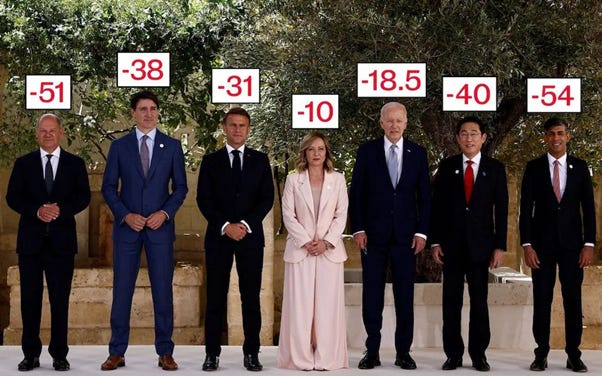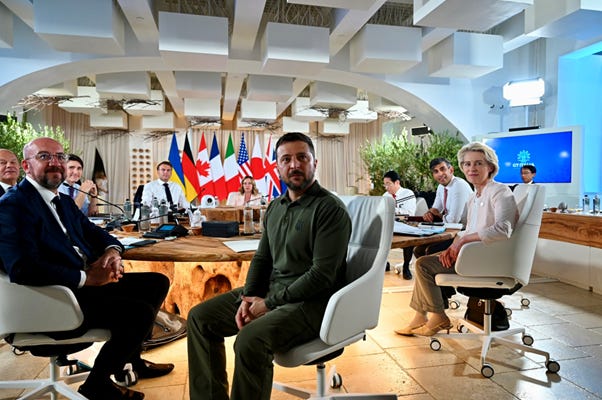The Western order in freefall
If we were looking for a picture that told a thousand words about the state of western power, this was it.
At the 50th G7 summit, Joe Biden stands vacantly on a green in Southern Italy with a well-dressed contingent of Group of Seven (G7) leaders for a photo op. As parachutists land perfectly before the throng, each emblazoned with a flag from the member nations, the President turns around and wanders away, baring his back to his nervous companions, going vacantly off script like he so often does throughout his troubled presidency. If we were looking for a picture that told a thousand words about the state of western power, this was it.
With the world in a state of flux, and the western world caught up in most of it, much attention has been thrust on the Biden administration and its first term in government. Although the previous term of Donald Trump had been criticised for being belligerent on the world stage, for all his bellicose language and tough talk, it has been the Biden Presidency that has overseen the wars that we see unfolding, and the Biden presidency that ultimately bears the responsibility for the current state of play.
Currently, over 500,000 Ukrainians have been reported dead on the battlefield as the biggest modern war since WWII unfolds on the European landmass. Over 40,000 Palestinians are confirmed killed in the rolling genocide in Gaza, and heightened tensions in Asia look to send the world toward a Cold War 2.0 in the best-case scenario. With valid questions about his age, cognition and health aside, experts are critical of the Biden White House for its prime role in the dangerous war in Ukraine, and international and domestic option weighs heavily against Washington’s approach to supporting Israels actions in Gaza, and tensions in the Indo-Pacific have continued unabated. The world has not been a safer place under President Joe Biden.
The first half of Biden’s term was defined by his management (or lack thereof) of the COVID pandemic. The half-time break featured the withdrawal of US troops from Afghanistan, and for a brief moment the world knew a world without (official) US war on this earth. But the tranquillity only lasted a short while, and the second half of his Presidency has been filled with major conflict in Ukraine, humanitarian crisis in Gaza, and worsening global environmental and economic problems, all made the more incoherent by the clear decline in health that has come to overshadow his presidency.
Acts of withdrawal and bewilderment have become more frequent in recent times, with most public appearances fraught with something that doesn’t go to the script: a cognitively deteriorating octogenarian President who can’t stay on point, talking with an absent coldness as he strings along lines held together by the faint muscle memories of six decades cutting deals with devils in the swampy halls of power around Washington DC.
Like Biden, the health of US President Franklin Delano Roosevelt was deteriorating during crucial stage of the Second World War. Roosevelt secured his historic fourth term presidency in ailing health, with virtually no competition from alternative candidates from the Democrats. In the middle of the Second World War, FDR would go on to defeat Republican nominee Thomas E. Dewey comfortably to secure the historic fourth term in 1944. He would last no longer than three months in the job, collapsing to his death while posing for a portrait in March 1945.
But Joe Biden is not FDR and his legacy is not comparable. He comes from a different environment and he sits in a different place in history. Biden’s legacy is based in the corporate-motivated, post-war rabbit warrens of Washington, not in the sweeping grand national ideas of the transformative Roosevelt. Unlike FDR, who steered America out of the great depression, implemented “The New Deal”, and transformed the country into an unrivalled superpower using a conscious, cogent and sound mind that projected a vision on behalf of the American people, Biden secured his first term with his health already in question, inherited a Presidency during a time of economic, political and domestic decline with no intention of addressing it, and has no legacy other than the perpetuation of debt and war on the behalf of a rapacious transnational private elite at the cost of the American taxpayer.

As the cognitively unavailable Biden intermittently and semi-consciously led a throng of unpopular leaders at the G7 in Italy, no amount of fancy dress could cover the negative approval ratings that the visitors faced at home. French President Emmanual Macron has called snap elections as his popularity plummets, a “mounting crisis of confidence” confronts German Chancellor Olaf Scholz, Japanese Prime Minister Kishida’s cabinet's approval rate hits its “lowest level”, Canadian Prime Minister Justin Trudeau is looking at “50-year-low poll numbers”, and UK PM Rishi Sunak is on level with the “all-time record low for a Prime Minister”. While a strained G7 gathered, the only attendee that enjoyed reasonable polling numbers was the Prime Minister of the host nation, the far-right Giorgia Meloni – a harbinger for what awaits.
With the rearranging of political homeostasis in the German political system and the political success of far-right parties such as the AFD, and the established popularity and mainstreaming of Marine Le Pen in France, the far-right has returned to Europe, and all it took was a promise to play to deliver US strategic goals in Ukraine. With the return of Donald Trump on the horizon, imminent elections on the cards in many of the G7 member nations, and recent voting in the EU bringing in a host of new far-right candidates to the European Parliament, the G7 could have an entirely different feel when it meets again in the future.
Far away in Australia, away from the hemisphere where all the action is going down, a bipartisan blob in Canberra doubles down into upholding the crumbling “rules-based order” without even really being able to tell us what it stands for. Instead of focusing on forging its place in a multi-polar Asia, the most economically dynamic and conflict-free region on the planet, the Albanese government is in total policy lockstep with the collective west, handballing our strategic destiny to a system that is haemorrhaging under the leadership of either a high-care dementia patient with ghouls escaping from the closet on one side, or the spectre of a low-moral narcissist property developer on the other.
Australia always had the chance to choose its own destiny in its own region, to be diplomatically and economically conscious in Asia, to work with its neighbours to modify the great powers that currently look to turn our home into a battleground, but it has chosen to double-or-nothing into the “rules-based order”, putting its geographical blinkers on and muttering diplomatic na-na-nana-na’s with fingers in their ears, choosing to back a shrinking and increasingly aggressive Atlanticist system in another hemisphere thousands of miles away, while acting as some backwater outpost who bites the hands that feeds closer to home. With the lever of sovereignty jammed permanently in ‘relinquish’ mode due to a bipartisan political period of ultimate stagnation, where the entire governing class has not been able to produce, let alone dream, one piece of natively inspired policy in the national interest, consecutive modern Australian governments have made the mistake of outsourcing our strategic future, and it apparently lies in the hands of the people we just saw at the clown show in Apulia.

As the G7 event concluded, unelected President of the European Commission Ursula von der Leyen, ever-present at so many events that seem above her pay grade and out of her subject matter expertise, crawled out of the shadows, and instead of calling for peace talks to avoid a possibly imminent nuclear war with Russia or an immediate ceasefire to the worst humanitarian disaster in history occurring in Gaza (like any western leader once upon a time would have been expected to do), brought the summit to a close by announcing an almost €47 billion loan for Ukraine made up from Russian assets. Another call for war, at a time that the world does not need it, spoken by leaders that have abrogated duty to maintain peace, and forgone their responsibility to humanity.
If there was to be some hope, a different approach to relieving these deepening crises, it was not to be found among the people gathering at the G7 in Apulia. And it no longer seems to be found in the West. The failing body and mind of President Joe Biden, Meloni the harbinger of the far-right future in Europe that hosted him, and one of the most unpopular group of leaders combined together in the history of the summit, seemed to perfectly capture the state of decay and rancour that pervades the “rules-based order”. A snapshot of all that hasn’t worked consecutively in the Biden era of end-stage neoliberalism and the crumbling Western-led order, and a footnote in history that may be heavily criticised one day when this is all over.



We couldn't ask for two more appropriate figureheads to symbolise the terminal phase Empire - a decrepit, corrupt insider and a loud-mouthed, self-absorbed con-artist, both belligerent and incoherent - says it all, really. I just wish people would remember that although the figurehead points in the direction the ship is heading, it is not at the helm.
As for Australia, a vassal has little say over its foreign policy but it does occasionally have one very important decision to make - when to switch empires. We've managed it successfully once already, and that time has come again.
What Australia needs is for our government to grow a spine, stand up to Rupert and the vested interests he represents, and act towards our long term benefit. This is, of course, not going to happen. Luckily, Australians have preferential voting, making it easier for us to expand the cross bench. With a series of minority governments, a sufficiently engaged public might get a word in edgewise and make the course correction required.
Palestine may be crucial here, since it creates an impetus for political engagement outside of culture war distraction.
If it wasn't so horribly true and very, very depressing it's almost tragicomic and somehow, Joel, you encapsulate this.
The devils in the swampy halls of power
the Canberra bipartisan blob
At times I think the leaders don't really matter, it's the corporate power behind them that determines what happens. The leaders are the symbols. So it looks like it's the more extreme right-wing corporate powers and lobbyists that are in ascendance. Because they have more money? Because they have found some so-called leaders, popularist leaders, who appeal to a manipulated and fearful population?
And Australia? How many years since Keating tried to get us to think about being part of the Asian region? We did for a tiny bit, but then we all know what happened. And current Labor has simply taken up from those Howard years.